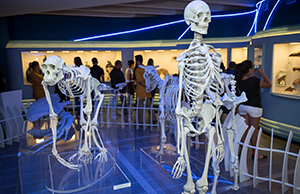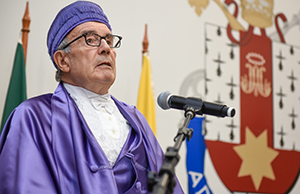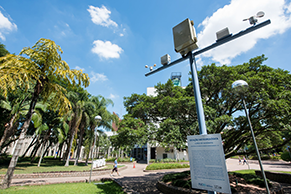Radar
National and international recognition
PUCRS ranks as the best private higher education institution of Brazil, as per Folha de São Paulo University Ranking (RUF), published by Folha de S. Paulo. Among public and private institutions, it has moved up four positions from 22nd in 2016 to 18th in 2017. It has become the first private institution to rank higher than PUC-Rio (20th) since 2012. In terms of Research, the university climbed four positions too: from 24th to 20th. As for Internationalization, it ranks atop public and private universities in Rio Grande do Sul. 2017’s significant achievements were featured in the Times Higher Education list, as PUCRS appears as the best private institution of RS, among 1000 universities around the globe. In the Campeãs da Inovação list, from Revista Amanhã, is has been considered the most innovative educational institution in the south of Brazil.
Traits of Evolution
 PUCRS’ Science and Technology Museum (MCT-PUCRS), in partnership with the Great North Museum: Hancock, from Newcastle University (UK), launched the exhibit Traits of Evolution. Based on a phylogenetic tree, a big “tree of life”, it show its contemporary take on the evolution of organisms, focusing on the changes that have occurred throughout the evolutionary process which, from natural selection, facilitated the formation of such organisms. The exhibit stemmed from the project “The use of museums’ scientific collections for teaching evolution and understanding of environmental changes from the ecomuseological perspective”, which was selected by the British Council Brasil, being sponsored by Newton Fund, one of the most important British funds for funding and development of research and innovation in the UK.
PUCRS’ Science and Technology Museum (MCT-PUCRS), in partnership with the Great North Museum: Hancock, from Newcastle University (UK), launched the exhibit Traits of Evolution. Based on a phylogenetic tree, a big “tree of life”, it show its contemporary take on the evolution of organisms, focusing on the changes that have occurred throughout the evolutionary process which, from natural selection, facilitated the formation of such organisms. The exhibit stemmed from the project “The use of museums’ scientific collections for teaching evolution and understanding of environmental changes from the ecomuseological perspective”, which was selected by the British Council Brasil, being sponsored by Newton Fund, one of the most important British funds for funding and development of research and innovation in the UK.
Doctor Honoris Causa
 PUCRS awarded German philosopher and researcher Ludger Honnefelder with an honorary degree. The recognition came from the School of Humanities. Honnefelder is Professor Emeritus of Philosophy at the University of Bonn (Germany) and has written many articles on medieval philosophy, metaphysics and ethics. He was also invited to deliver lectures in two events at the University: the 8th Brazil-Germany Symposium of Sustainable Development and the International Symposium 500 Years since the Reformation: Legacies and Challenges.
PUCRS awarded German philosopher and researcher Ludger Honnefelder with an honorary degree. The recognition came from the School of Humanities. Honnefelder is Professor Emeritus of Philosophy at the University of Bonn (Germany) and has written many articles on medieval philosophy, metaphysics and ethics. He was also invited to deliver lectures in two events at the University: the 8th Brazil-Germany Symposium of Sustainable Development and the International Symposium 500 Years since the Reformation: Legacies and Challenges.
Graduate Programs
PUCRS ranks atop a list of public and private higher education institutions (HES) that offer ten or more graduate programs, according to the Federal Agency of Evaluation and Support of Graduate Education (Capes). This has been the country’s biggest improvement from 2013 to 2016. Out of the 24 graduate programs offered at the University, 7 have had their quality improved and, overall, 11 have been classified as programs of international excellence. PUCRS has a score of 5.36 among the HEIs offering ten or more graduate programs according to CAPES’ preliminary evaluation. Capes evaluates programs on a scale that goes up to 7, but programs awarded grade 6 are considered of international excellence.
Nobel Prize
Paulo Henrique Hoeckel, a graduate student in the Business School’s Development Economics program, joined a group of 400 students selected for the 6th Meeting on Economic Sciences, in Germany, last August. Once a year, around 20 winners of Nobel Prizes in Economic Sciences get together in Lindau, Germany, to meet with the next generation of scientists. “I served as a speaker in one of the sessions. I gave a presentation and the Nobel Prize committee gave it a careful analysis”, says he.
Social responsibility
PUCRS has won the Ojo de Plata 2017, a prize given by the Social Responsibility Regional Center for Latin America and the Caribbean (Orsalc), accountable to the Unesco International Institute for Higher Education in Latin America and the Caribbean, which recognizes the good practices and experiences of the University in social responsibility. The annual prize, was given to the hands of the President of PUCRS, Br Evilázio Teixeira, at the 5th Regional Latin America and the Caribbean Forum – Territorial Social Responsibility, at the Universidad Nacional Mayor de San Marcos, in Lima (Peru).
Weather station
 The Geography program, on behalf of its Image Treatment and Geoprocessing Laboratory, has been given a weather station from Cambridge University’s Raspberry Pi Foundation. The equipment, which is yet to be available in the market, will be used to check weather data on Campus. The difference between the temperature at PUCRS and that of other areas of Porto Alegre may vary up to 3°C. The equipment has been installed between buildings 15 and 6. The Porto Alegre weather forecast can be checked on www.wunderground.com and at the main hall of building 5. The equipment records wind speed, rainfall, pressure, air quality, wind direction and ground temperature.
The Geography program, on behalf of its Image Treatment and Geoprocessing Laboratory, has been given a weather station from Cambridge University’s Raspberry Pi Foundation. The equipment, which is yet to be available in the market, will be used to check weather data on Campus. The difference between the temperature at PUCRS and that of other areas of Porto Alegre may vary up to 3°C. The equipment has been installed between buildings 15 and 6. The Porto Alegre weather forecast can be checked on www.wunderground.com and at the main hall of building 5. The equipment records wind speed, rainfall, pressure, air quality, wind direction and ground temperature.



